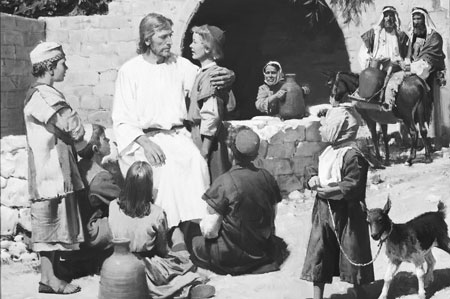He then took a little child, set him in front of them, put his
arms round him, and said to them, ‘Anyone who welcomes one of these little
children in my name, welcomes me; and anyone who welcomes me welcomes not me
but the one who sent me.’
Mark 9: 36 – 37
One of the mythic qualities
of our Abrahamic faith is its generational transmission of stories that reach
deep into time, of the unfolding of God’s self-revelation to his creatures. The
Hebrew and Christian scriptures make much of the way that this is transmitted.
The naming of the unnamed God as the God of Abraham, Isaac and Jacob, the
genealogies that reach from Adam to David and thence to Jesus (Luke 3:23ff, and
Matthew 1:1ff) radically highlights the way in which the way this salvific
story was intended to be spread. From generation to generation, in fulfilment
of God’s promise to Abraham (Genesis 15).
Our obligation to our
children and to our children’s children is that we pass on this story with
fidelity and love. And while we may no longer sit around a desert campfire
intently hearing, remembering and reliving this story, we prepare our children
to be open to the possibilities of knowing this wonderful God.
Our dreams for our children, our deepest desires for them, are not
always met in ways that we expect, they may be exceeded or be disappointingly
unsuccessful. When the journey we commence becomes unstuck or fraught with
difficulties, these must be overcome.
While the Catholic school places Christ at the centre, and it is he who
brings its members together, who gives it strength, who is its foundation, it
is still a human institution with all the frailties, faults and limitations of
such institutions. None of us is perfect. What the Gospel invites us to do is
to be rigorous about keeping our heads clear: know the common purpose and
common mind, and most of all be gently persuaded by love.
Peter Douglas
Reverse
Mission by Richard Rohr
Jesus, perhaps disappointingly, gives no
abstract theory of social justice. Instead, Jesus makes his life a concrete
parable about how to live in this world. He demands of his first followers that
they be living witnesses to a simple life on the edge of the dominant
consciousness. Once you are at the visible center of any group, or once you are
at the top of anything, you have too much to prove and too much to protect.
Growth or real change is unlikely. You will be a defender of the status
quo--which appears to be working for you. Every great spiritual teacher has
warned against this complacency. The only free positions in this world are at
the bottom and at the edges of things. Everywhere else, there is too much to
maintain--an image to promote and a fear of losing it all--which ends up
controlling your whole life.
An overly protected life--a life focused
on thinking more than experiencing--does not know deeply or broadly. Jesus did
not call us to the poor and to the pain only to be helpful; he called us to be
in solidarity with the real and for own transformation. It is often only after
the fact we realize that they helped us in ways we never knew we needed. This
is sometimes called "reverse mission." The ones we think we are
"saving" end up saving us, and in the process, redefine the very
meaning of salvation!
Only near the poor, close to "the
tears of things" as the Roman poet Virgil puts it, in solidarity with
suffering, can we understand ourselves, love one another well, imitate Jesus,
and live his full Gospel. The view from the top of anything is distorted by
misperception, illusions, fear of falling, and a radical disconnection from the
heart. You cannot risk staying there long. As Thomas Merton said, "People
may spend their whole lives climbing the ladder of success only to find, once
they reach the top, that the ladder is leaning against the wrong wall."
I believe that, in the end, there are
really only two "cauldrons of transformation": great love and great
suffering. And they are indeed cauldrons, big stew pots of warming, boiling,
mixing, and flavouring! Our lives of contemplation are a gradual, chosen, and
eventual free fall into both of these cauldrons. There is no softer or more
honest way to say it. Love and suffering are indeed the ordinary paths of
transformation, and contemplative prayer is the best way to sustain the fruits
of great love and great suffering over the long haul and into deep time.
Otherwise you invariably narrow down again into business as usual.
One of the mythic qualities
of our Abrahamic faith is its generational transmission of stories that reach
deep into time, of the unfolding of God’s self-revelation to his creatures. The
Hebrew and Christian scriptures make much of the way that this is transmitted.
The naming of the unnamed God as the God of Abraham, Isaac and Jacob, the
genealogies that reach from Adam to David and thence to Jesus (Luke 3:23ff, and
Matthew 1:1ff) radically highlights the way in which the way this salvific
story was intended to be spread. From generation to generation, in fulfilment
of God’s promise to Abraham (Genesis 15).
Our obligation to our
children and to our children’s children is that we pass on this story with
fidelity and love. And while we may no longer sit around a desert campfire
intently hearing, remembering and reliving this story, we prepare our children
to be open to the possibilities of knowing this wonderful God.
A common purpose we share in our Catholic schools is the education and
care of the young people entrusted to us, and who with their families, join us
as one community. Indeed we share a common mind about what we desire for our
children – an education that reaches and nurtures the spiritual, physical,
emotional and academic aspects of our children’s lives. The Church asserts and
supports the rights and obligations of parents as first educators of their
children.
Our dreams for our children, our deepest desires for them, are not
always met in ways that we expect, they may be exceeded or be disappointingly
unsuccessful. When the journey we commence becomes unstuck or fraught with
difficulties, these must be overcome.
While the Catholic school places Christ at the centre, and it is he who
brings its members together, who gives it strength, who is its foundation, it
is still a human institution with all the frailties, faults and limitations of
such institutions. None of us is perfect. What the Gospel invites us to do is
to be rigorous about keeping our heads clear: know the common purpose and
common mind, and most of all be gently persuaded by love.
Jesus, perhaps disappointingly, gives no
abstract theory of social justice. Instead, Jesus makes his life a concrete
parable about how to live in this world. He demands of his first followers that
they be living witnesses to a simple life on the edge of the dominant
consciousness. Once you are at the visible center of any group, or once you are
at the top of anything, you have too much to prove and too much to protect.
Growth or real change is unlikely. You will be a defender of the status
quo--which appears to be working for you. Every great spiritual teacher has
warned against this complacency. The only free positions in this world are at
the bottom and at the edges of things. Everywhere else, there is too much to
maintain--an image to promote and a fear of losing it all--which ends up
controlling your whole life.
An overly protected life--a life focused
on thinking more than experiencing--does not know deeply or broadly. Jesus did
not call us to the poor and to the pain only to be helpful; he called us to be
in solidarity with the real and for own transformation. It is often only after
the fact we realize that they helped us in ways we never knew we needed. This
is sometimes called "reverse mission." The ones we think we are
"saving" end up saving us, and in the process, redefine the very
meaning of salvation!
Only near the poor, close to "the
tears of things" as the Roman poet Virgil puts it, in solidarity with
suffering, can we understand ourselves, love one another well, imitate Jesus,
and live his full Gospel. The view from the top of anything is distorted by
misperception, illusions, fear of falling, and a radical disconnection from the
heart. You cannot risk staying there long. As Thomas Merton said, "People
may spend their whole lives climbing the ladder of success only to find, once
they reach the top, that the ladder is leaning against the wrong wall."
I believe that, in the end, there are
really only two "cauldrons of transformation": great love and great
suffering. And they are indeed cauldrons, big stew pots of warming, boiling,
mixing, and flavouring! Our lives of contemplation are a gradual, chosen, and
eventual free fall into both of these cauldrons. There is no softer or more
honest way to say it. Love and suffering are indeed the ordinary paths of
transformation, and contemplative prayer is the best way to sustain the fruits
of great love and great suffering over the long haul and into deep time.
Otherwise you invariably narrow down again into business as usual.










































































